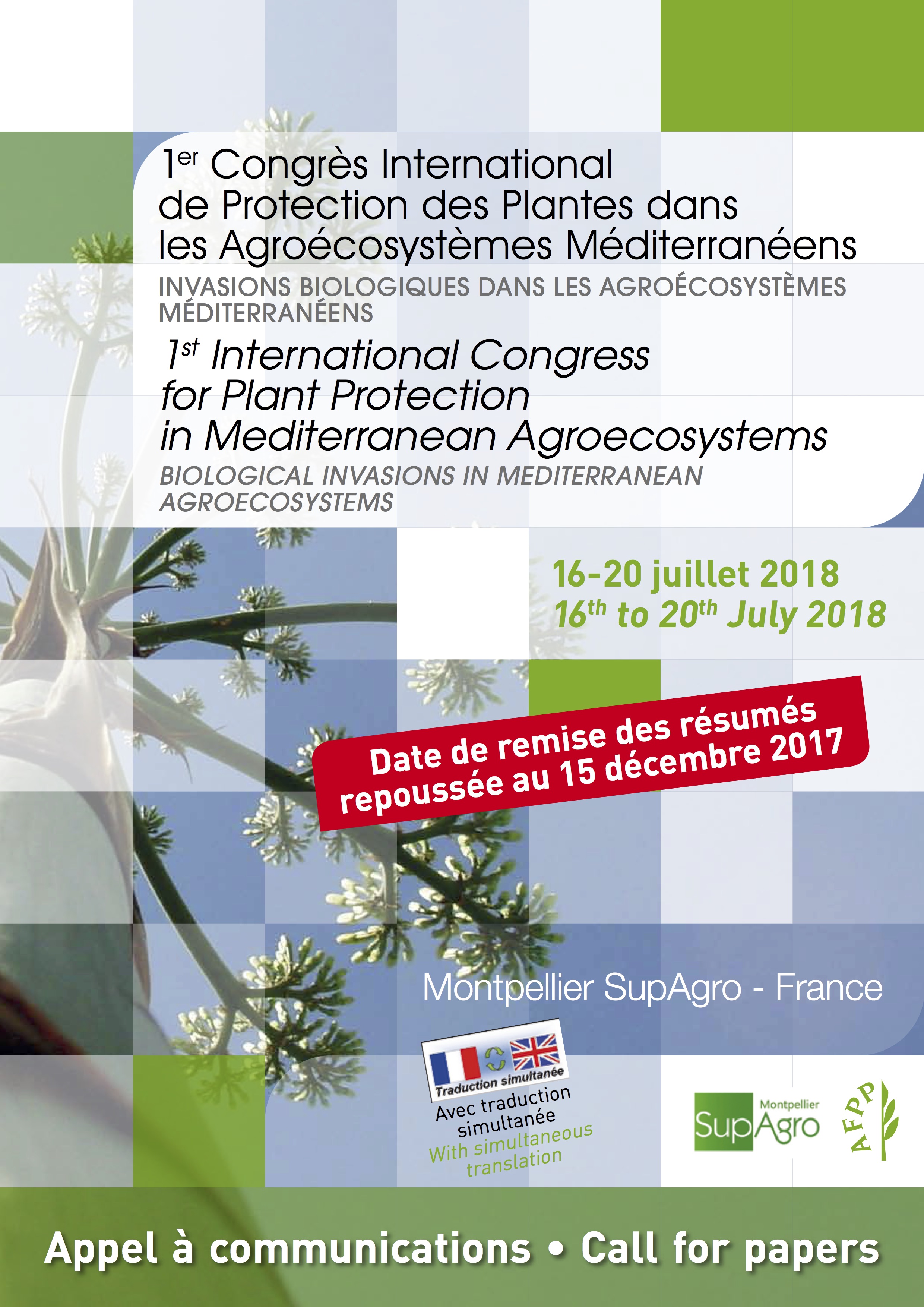|
|
|
1st International Congress for Plant Protection in Mediterranean Agroecosystems BIOLOGICAL INVASIONS IN MEDITERRANEAN AGROECOSYSTEMS |
|
16th to 20th July 2018 |
|
Montpellier SupAgro - France |
|
GENERAL PRESENTATION Mediterranean context “The multidimensionnality of the agricultural and rural question in the Mediterranean militates to engage an euromediterranean mobilization on this subject. Because agriculture is in the middle of the Mediterranean identity and is displayed like an essential determinant for the economies and the companies of the area... The wealth of natural resources and the diversity of the landscapes of the Mediterranean make of it an exceptional eco- region of this world. However with human development and industrialist this environmental heritage erodes little by little... The impact of the climate change the threats of the biodiversity of the zone, the soil erosion or the polluting emissions caused by energy consumption constitute powerful testimonies of this increasing vulnerability of Mediterranean space...”1 Specific constraints In addition to its climatic unity, the Mediterranean basin offers both an exceptional biodiversity of ecosystems, with remarkable plant endemism, and very similar agrosystems, with some being very intensive (biodiversity loss) and very traditional (biodiversity conservation). But this diversity is endangered given that the Mediterranean basin is one of the world areas most affected by climate changes and anthropic activities. For this reason, it deserves a special attention in order to avoid compromising its ecosystem heritage. On one hand, the asymmetry of the trade relationships across the Mediterranean Sea lead South and East Mediterranean countries to increase their offer to the detriment of their environments. On the other hand, ecological pressure in North countries leads to a major thought on ecological intensi cation of agriculture. Thus, the new ecological conquest of the North-Mediterranean soils requires new integrated strategies whose components are often empirical practices in traditional farming systems of the South. The issue Research developed around the Mediterranean basin cannot disregard the complexity of the processes involved by global changes, especially in relation to climate and anthropic activities. They can no longer be con ned to agronomic approaches, and must contemplate more systemic framework2. Given the diversity of the Mediterranean eco anthroposystems and the diversity of weakening mechanisms imposed on them, Mediterranean countries are exceptionally suited for developing these research approaches. Goals Following objectives for restoration of disturbed agrosystems, it is becoming urgent to understand the contribution of invasives species within all degradation functions, and especially in the context of fast programmed elimination of pesticides. To give relevant answers to the questions carrying about the role of the harmful organizations and the invasive species in the degradation of the Mediterranean eco anthroposystems due to parasites, the 1st congress ICPPMA will included the following sessions: - Food webs in Mediterranean Agroecosystems- Epidemiological surveys in Mediterranean Plant protection- Role and functioning of phytosanitary agencies in the context of new emerging pests - IPM: agroecological structures and “biocontrôle” in Mediterranean Agroecosystems - NTIC in plant protection in the Mediterranean - Regulations in plant protection in the Mediterranean. 1. Hervieu B. 2007 Cah. Agric. 16: 247-250
2. www.millenniumassessment.org
CALL FOR PAPERS AND POSTERS All submitted papers, if accepted, will be selected for either an oral presentation or a poster. All the presentations (for any poster or oral presentation) must be accompanied by a full scienti c paper in order to be published in the conference proceedings. An abstract of this article will be published in the proceedings and the full article will be available as an electronic copy; both given to the conference attendees. People whose communication has been accepted as a poster must be present during all related poster sessions to answer any questions from participants.
SIMULTANEOUS TRANSLATION A simultaneous French-English and English-French translation will be provided during the plenary sessions.
COMMUNICATION AND EXCHANGE The communication area of the 1st ICPPMA will provide a friendly atmosphere for each company to discuss and relay information on their activities. High quality stands will be proposed and precisions will be given by post at a later date.
PRICES 480 euros (lunches included) for 4.5 of Congress days and a half-day to visit.
DEADLINES Abstract submited before December 15th 2017 Acceptance or refusal of abstracts: January 20th 2018 Full texts: March 1st 2018
CONFERENCE PLACE The 1st Congress ICPPMA will be held from July 16th to 20th 2018 at Montpellier SupAgro - 2, place Pierre Viala - 34060 Montpellier (France).
HOW TO SUBMIT A PAPER Those interested in presenting a paper must complete the enclosed “call for papers” form or ll in the online form on our website www.ICPPMA.com at the latest by December 15th 2017. Passed this deadline, no paper will be accepted. The acceptance or refusal of each proposal will be communicated by the Scienti c committee on January 20th 2018 the latest. Full texts must be sent before March 1st 2018. After peer- review, the nal corrected version must be returned no later than May 15th 2018. For all information, please contact: AFPP - Phone +33 (0)1 41 79 19 80
E-mail : This email address is being protected from spambots. You need JavaScript enabled to view it.
|
|
Site internet : www.ICPPMA.com |

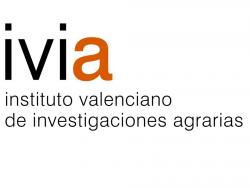 |
|
FPI 2017 PREDOCTORAL CONTRACT A pre-doctoral contract (FPI) is offered, of up to four years to be held at the INSTITUTO VALENCIANO DE INVESTIGACIONES AGRARIAS (IVIA). The research to be carried out will be framed in the action: "Biological control of citrus psyllids" whose reference is INIA-2017-0029. We are looking for candidates highly motivated by research and interested in the biological control of agricultural pests. The training in entomology and ecology, as well as the experience in molecular techniques and data analysis will be evaluated. Detailed information about the call, as well as application forms, can be found here Those interested can contact Alberto Urbaneja (This email address is being protected from spambots. You need JavaScript enabled to view it.) for more details on the project and the group. The presentation of documents must be done via the web of the ministry. The deadline for submission will be from October 3, 2017 to October 18, 2017 at 3:00 p.m. (Spanish time). |

Integrative study of interactions within a loose association (host - micropredator - non- hematophageous arthropods): toward an agroecological management of poultry livestock buildings.
The general objective of the thesis is to explore the determinants of the interactions among mites living in the environment of poultry in farm buildings in order to develop innovative and sustainable practices of biological control against Dermanyssus gallinae, the Poultry Red Mite.
This mite is an obligatory hematophagous bird mite and a major pest of laying hens. It is not a typical parasite, but more a micropredator, similar to adult female mosquitoes and bedbugs. It lives at a distance from the host and comes into contact with it only during short and rare meals. As such, this pest mite forms an integral part of the microhabitats’ food webs in farm buildings. Therefore, (1) conventional treatments are largely unsatisfactory, (2) this bioagressor is an ideal target for biological control by natural enemies inhabiting the poultry environment.
Our working hypothesis is that observed differences in the pest mite infestation behavior between farms (some with strong and recurrent outbreaks, others with consistently low levels of infestation) are related to the composition of predatory mite assemblages and to the relative spatial distribution of these and the pest mite population.
To state whether and how the emulation of ecological processes of the pest mite regulation might be reached by the intensification of predation activity by indigenous mesostigmatid mites (conservation biocontrol), we started work in the framework of a partnership between the CEFE and the ITAVI (Technical Institute of AVIculture). We have already collected data on the composition of typical mite communities in French layer farms.
The study aims now to characterize the food webs involving the mesostigmatid mites in the different microhabitats available both in terms of protagonist identification (who feeds on who?) and location of predation events (where in the building are prey attacked?). In parallel, we need to further investigate the determinants of the movements and spatial distribution of the pest mite. Then, results from these two axes will be explored together in order to state whether and how local actions may contribute to enhance pest- mitigating ecological processes.
Requirements for applicants:
-
- Master of Science (MSc; five years after diploma equivalent to the French baccalaureate)
-
- Applicants are expected to have a strong interest to applied and operational research, to be able to
work as part of a team and to interact with other stakeholders (frequent interactions with operators
from the poultry industry)
-
- Appetite for experimental field and lab activities (bioassays, basic molecular biology ...)
o Thoroughness,noreluctancetohandlelivingmites
o Abilitytolargelyuseopticalinstrumentssuchasmicroscopesandstereomicroscopes
-
- Good communication skills in spoken and written English are required.
Deadline for application: 30th September, 2017.
Documents to send in your application:
- CV.
- Cover letter outlining your motivations.
- Contact information for 2 persons who can serve as references.Contact:
Lise Roy and Rumsais Blatrix
Center for Evolutionary and Functional Ecology, CNRS - Université de Montpellier - Université Paul Valéry Montpellier - EPHE, 1919 route de Mende, 34293 Montpellier cedex 5, France.
Emails: This email address is being protected from spambots. You need JavaScript enabled to view it. & This email address is being protected from spambots. You need JavaScript enabled to view it.
Tel. Lise Roy: +33 6 69 78 76 87

XV International Congress of Acarology
Antalya (Turkey)
2 – 8 September 2018
The XV International Congress of Acarology (XV ICA) will be held at the WOW Topkapi Palace Hotel in Antalya, Turkey from 2 - 8 September, 2018.
The congress hotel (http://www.wowhotels.com/Topkapi-Palace/) is 17 km from Antalya International Airport and 20 km from the city centre.
The five day congress will have four days of oral and poster presentations and a one day technical and social tour. There will also be an optional one day post-congress tour to the fascinating ancient sunken coastal city of Kekova.
Antalya has an enormous greenhouse industry producing vegetables and flowers for the domestic and export markets. The half day technical tour will visit the most up-to- date production facilities. The remainder of the day will be spent visiting a major historic site, the Aspendos ampitheatre, and the magnificent Manavgat Waterfall.
Please address any questions regarding registration, accommodation and on-line submission to the organising secretary (This email address is being protected from spambots. You need JavaScript enabled to view it.). Scientific matters should be addressed to the secretary (This email address is being protected from spambots. You need JavaScript enabled to view it.). As we begin planning sessions for the congress, your ideas and proposals for organising a symposium or seminar are very welcome.
XV ICA Organising Committee
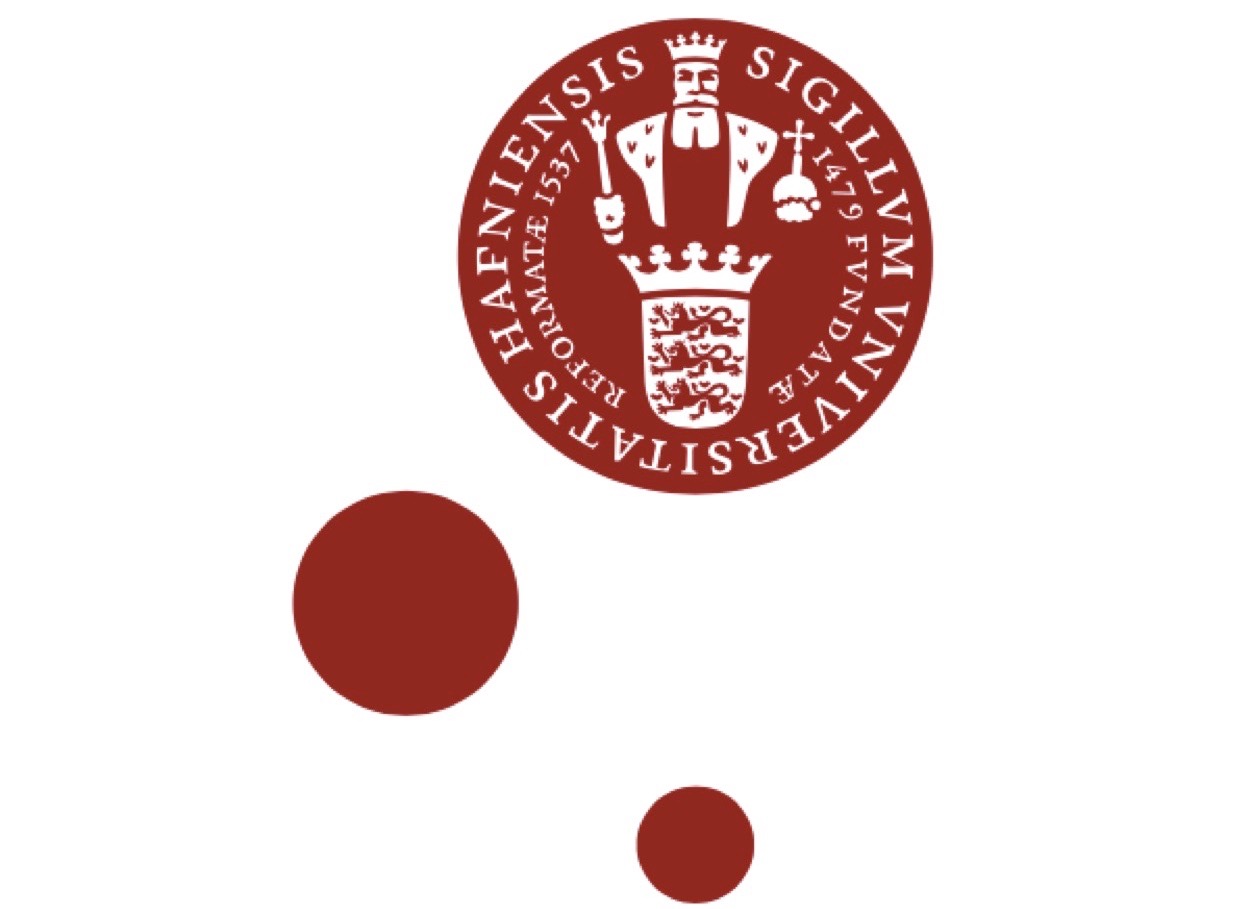 |
|
Postdoc within Entomology and Biological Control Department of Plant and Environmental Sciences, University of Copenhagen (UCPH) invites applications for a position as postdoc within entomology and biological control with focus on using entomopathogenic fungi as a tool in IPM for control of larvae of the cabbage root fly (Delia radicum) in the soil-root interphase. The postdoc will be part of the newly funded European network project FlyIPM under the initiative C-IPM (Coordinated Integrated Pest Management in Europe) which includes 8 countries. The framework of the overall project is presented at http://c-ipm.org/news/nyhed/artikel/getting-to-the-root-of-root-flies/. The activities at UCPH will mainly be coordinated with partners from UK, Ireland and Norway. At UCPH, the postdoc will be responsible for testing different application methods of entomopathogenic fungi during cabbage seedling propagation in greenhouse settings for evaluation of fungal establishment in the soil-root interphase. Infection success and survival of root fly larvae related to the different application methods will be assessed. Focus will be on methods with practical relevance for growers. The postdoc position is 17 months with starting date of 15 July 2017 or as soon as possible thereafter. Qualifications and selection criteria
The postdoc is expected to be enterprising and have excellent English communication skills. The postdoc’s duties will include research within the project FlyIPM, as well as occasional teaching. The post may also include performance of other duties. Further information on the Department is linked at http://www.science.ku.dk/english/about-the-faculty/organisation/. Inquiries about the position and the activities within FlyIPM can be made to Associate Professor Nicolai V. Meyling by e-mail: This email address is being protected from spambots. You need JavaScript enabled to view it. The position is open from 15 July 2017 or as soon as possible thereafter. The University wishes our staff to reflect the diversity of society and thus welcomes applications from all qualified candidates regardless of personal background. Terms of employment Terms of appointment and payment accord to the agreement between the Ministry of Finance and The Danish Confederation of Professional Associations on Academics in the State. The starting salary is currently up to DKK 408,730 including annual supplement (+ pension up to DKK 69,893). Negotiation for salary supplement is possible. The application, in English, must be submitted electronically. Please include
The deadline for applications is 23 April 2017. After the expiry of the deadline for applications, the authorized recruitment manager selects applicants for assessment on the advice of the Interview Committee. You can read about the recruitment process at http://employment.ku.dk/faculty/recruitment-process/. Interviews will be held on 22-24 May 2017. MORE DETAILS HERE |
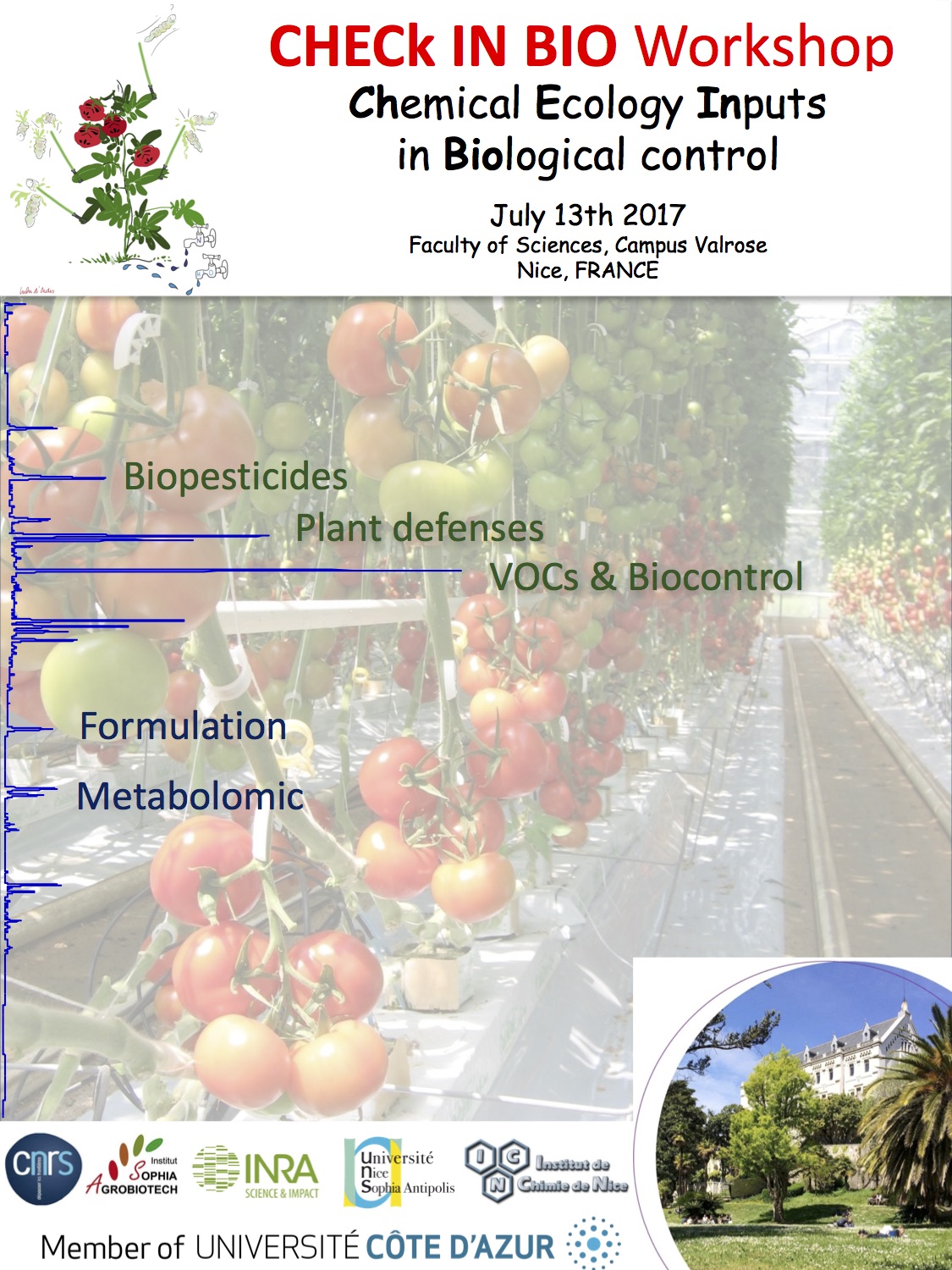
Despite strong demands of environmental and economical friendly methods, pesticide use largely dominates in the framework of IPM strategy (Integrated Pest Management). The biological control, based on natural biological processes and materials, could be an alternative and efficient approach. Many of these processes and/or materials involve chemical interactions. Chemical ecology deals with the intriguing chemical mechanisms which help control intra- and interspecific interactions among living beings. Research of chemical ecology is concerned with the identification and synthesis of the substances which carry information and with the developmental, behavioral, and ecological consequences of chemical signals.
The goal of the workshop "Check-in Bio" is to highlight the input of chemical approaches as solutions for some biological control issues. Chemical ecology could be a key approach to improve biological control through the optimization of biopesticides and Volatile Organic Compounds and Plant defenses.
Provisional planning
Morning PART 1 Biopesticides in Biocontrol / Formulation
Plenary speakers Antonio BIONDI, University of Catania, Italy
Cédric BERTRAND, University of Perpignan, France
Lucia ZAPPALA, University of Catania, Italy
Flash communications
Early afternoon PART 2 Plant Defense Mechanisms / Metabolomic approach – LCMS
Plenary speakers Jens ROHLOFF, NTNU, Trondheim, Norway
Romain LARBAT, University of Nancy, France
Flash communications
End afternoon PART 3 VOCs & Biological Control/ Metabolomic approach - GCMS
Plenary speakers Michael BIRKETT, Rothamsted Research, Harpenden, UK
Christine BECKER, ISA, Sophia-Antipolis, France
Flash communications
Free Registration but online subscription required, please send an email to : This email address is being protected from spambots. You need JavaScript enabled to view it.
The workshop "Check-in Bio" is organized in the framework of the ERANET STOMP project (Sustainable Tomato Production), funded by UNS, INRA-SPE and STOMP project and supported by the BOOST project (IDEX UCA) and the GDR Mediatech
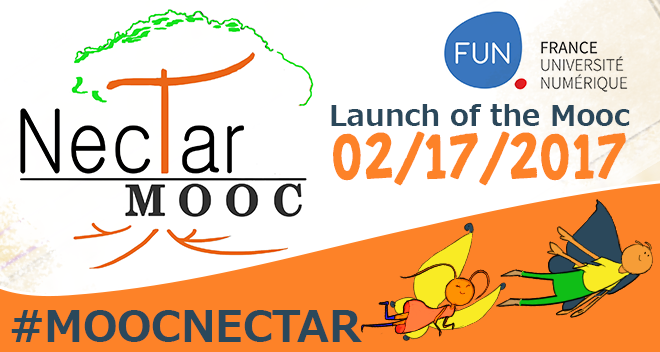
Montpellier SupAgro is pleased to present a new MOOC (free online course) on arthropod and nematode taxonomy challenges for agriculture. Unique in the world, Mooc Nectar (Nematodes, crops, taxonomy, arthropods) opens 17 February 2017 on the FUN (France Université Numérique) platform.
Students, professionals or a passionate public, curious about biodiversity, registration to Mooc Nectar: http://bit.ly/moocnectar
This MOOC delivers 5 weeks of coursework and other learning activities in French and English. It covers:
- Classification of arthropods and nematodes,
- Collection and trapping methods,
- Morphological and molecular identification methods,
- Application of these integrative concepts for agroecosystem management through case studies.
Participants will be able to acquire knowledge and exchange ideas with an international student community. Through innovative pedagogy, you will valorise your practical and scientific experience with the help of experts, professors and researchers, of Montpellier SupAgro and Agreenium partners.
For additional information and updates, see Montpellier SupAgro’s website: https://www.supagro.fr/web/en/pages/?idl=19&all=actualites&id=1257
For other questions, please contact Julien Rose, pedagogical engineer of the MOOC : This email address is being protected from spambots. You need JavaScript enabled to view it.
 |
Job title: Postdoctoral Research Fellow
Job reference: P50321
Date posted: 09/01/2017
Application closing date:19/01/2017
Location: Cornwall
Salary: The starting salary will be from £33,943 up to £41,709 on Grade F, depending on qualifications and experience.
Package: Generous holiday allowances, flexible working, pension scheme and relocation package (if applicable).
Job category/type: Academic
Job description: College of Life and Environmental Sciences
Biosciences
The University of Exeter is a Russell Group University in the top one percent of institutions globally. In the last few years we have invested strategically to deliver more than GBP 350 million worth of new facilities across our campuses with plans for significant further investment over the next three to five years.
The College wishes to recruit a Postdoctoral Research Fellow to participate in a high profile ERC funded project entitled 'Understanding and exploiting the P450 insect resistome'. This post is available from March 2017 until December 2020. The fellow will be based in the Bass lab and be part of a thriving group comprising several PhD students, post-doctoral research fellows and technicians.
The successful applicant will design and carry out experiments to investigate the evolution of insect resistance to xenobiotics. A range of state-of-the-art molecular and bioinformatic approaches will be used including analysis of next-gen sequencing data, PCR, QPCR, in vitro andin vivo expression of candidate genes and biochemical assays. The post-holder will also contribute to other activities in the Bass lab and act as the day-to-day line manager of a 0.6 FTE technician.
The successful applicant will be able to develop research objectives, manuscripts, projects and proposals; identify sources of research funding and contribute to the process of securing funds, and make presentations at conferences and other events.
Applicants will possess a relevant PhD or equivalent qualification/experience in a related field of study. The successful applicant will be a nationally recognised authority in the field of insect molecular biology and possess sufficient specialist knowledge in the discipline to develop research programmes and methodologies. The successful applicant will also be able to work collaboratively, supervise the work of others and act as team leader as required. Applicants should have experience in the majority of approaches detailed above.
For further information please contact Professor Chris Bass, e-mail: This email address is being protected from spambots. You need JavaScript enabled to view it..
Interviews are expected to take place on 25 January 2017.
To view the Job Description and Person Specification document please click here .
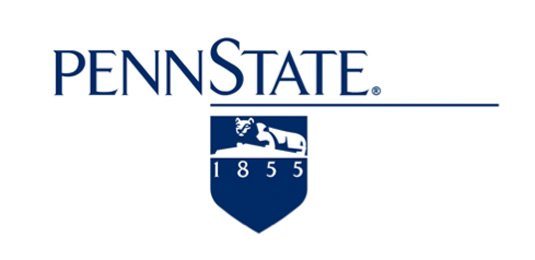
Campus/Location: University Park Campus
Date Announced: 09/06/2016
Date Closing: open until filled
Job Number: 66406
Work Unit: College of Agricultural Sciences
Department: Entomology
To apply: go to https://psu.jobs/job/66406
The Pennsylvania State University’s Department of Entomology is seeking a post-doctoral research associate to coordinate and conduct research and extension activities in a multi-disciplinary project to investigate the effects of crop, cover crops, and soil characteristics on the fungus, Metarhizium, a soilborne insect pathogen and plant-protective endophyte, in an organic agronomic cropping system.
Research will include isolation and identification of Metarhizium from on-going organic research-station and on-farm experiments using bioassay and molecular techniques; determination of ability of local isolates to form endophytic relationships with cash crops and selected cover crops; determination of the effects of endophytic Metarhizium on corn and two corn pests, black cutworm, Agrotis ipsilon, and the phytopathogen, Cochliobolus heterostrophus; and determination of the effect of endophytic Metarhizium on the expression of key defense genes in corn. The incumbent will help incorporate research information into extension and educational materials and activities, and into undergraduate curricula. The successful candidate will work directly with project team consisting of research and extension faculty, graduate and undergraduate students, postdoctoral researchers and technicians, research station personnel and a farmer and extension advisory panel in guiding the research and outreach education associated with the project. The successful candidate will possess excellent communication (oral and written), analytical, organizational and record-keeping skills, have the ability to manage multiple tasks and deadlines, must possess exemplary interpersonal skills and demonstrate an appreciation for working with diverse audiences in a team environment.
This position requires a recent PhD in Entomology, Plant Pathology, Plant Biology, Agronomy or related field that has equipped the applicant with the necessary knowledge, skills, and abilities to perform the duties and responsibilities of the position. Knowledge about the production of agronomic crops in a field and greenhouse setting is desirable.
Interested applicants should send a letter of application briefly describing their experience, interest in the position and career goals, curriculum vitae, copy of college transcripts, and contact information for three references to Dr. Mary Barbercheck, Department of Entomology, 501 Ag Sciences & Industries Bldg., University Park, PA 16802 or via e-mail at: This email address is being protected from spambots. You need JavaScript enabled to view it.. For more information about the position please contact Dr. Barbercheck; Dr. María del Mar Jiménez-Gasco, Dept. of Plant Pathology and Environmental Microbiology, This email address is being protected from spambots. You need JavaScript enabled to view it.; or Dr. Dawn Luthe, Dept. of Plant Sciences, This email address is being protected from spambots. You need JavaScript enabled to view it.. Screening of applicants will begin October 1, 2016 and will continue until a suitable applicant has been identified. The initial appointment will be for one year, with the opportunity for renewal contingent on the availability of funding.
Penn State is committed to affirmative action, equal opportunity, and the diversity of its workforce.

The Greek Diaspora Fellowship Program (GDFP), which is funded by the Stavros Niarchos Foundation and will be implemented and administered by the Institute of International Education, aims to support 40 U.S.- and Canada-based Greek-born academics to partner with Greek Universities over two application cycles. The selected Fellows will work in the areas of curriculum co-development, collaborative research and/or graduate student teaching/mentoring. You can read more about this exciting opportunity in the attached flyer or on the following websites:
http://www.iie.org/Programs/
http://www.snf.org/en/
The program is based on IIE’s successful Carnegie African Diaspora Fellowship Program (CADFP).
The Greek Diaspora Fellowship Program application cycle opened on June 1 - official deadline:
the call for project requests/scholar applications will be open until 11:59 PM EDT on September 1, 2016.
You may want to join IIE at a “How to Apply” webinar to be held on Wednesday, June 15 at 9 AM EDT/ 4 PM EET so you a better sense of how the program works.
Any questions about the program/application process can be forwarded to This email address is being protected from spambots. You need JavaScript enabled to view it..



